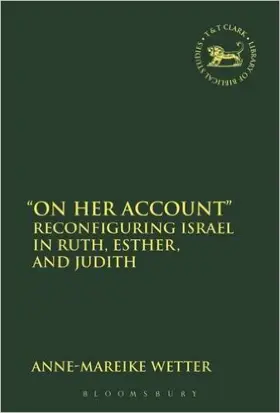

'On Her Account': Reconfiguring Israel in Ruth, Esther, and Judith
in Library of Hebrew Bible/Old Testament Studies
Pages
272
Publisher
T&T Clark
Published
2015
ISBN-13
9780567664297
Anne-Mareike Wetter investigates how the books of Ruth, Esther and Judith contribute to the discussion about Israel's ethnic and religious identity in the formative period following the Babylonian Exile. Although each of these narratives deals with variations of the theme of survival in a hostile world, the question underlying them is a different one: “Who are we, and who is our 'other'?” The narratives are presented as sequels to Israel's history as put forward in other (now biblical) texts, and presuppose God's continuing involvement with his people. However, they subtly modify the way in which Israel can or should relate to her God by suggesting alternatives for official Temple worship or bypassing the latter altogether. While older prophetic texts make use of metaphoric language portraying Israel as YHWH's unfaithful wife, grieving widow, or ravaged virgin, Ruth, Esther and Judith can be construed as embodiments of Israel of a different kind.
Wetter argues for a revisioning of Israel in and through the bodies of the three female characters, as a community which is simultaneously vulnerable and inviolable, marginalized and empowered. Their tricksterism, in all its comicality, underlines the precarious situation in which the women and the community they represent are caught. Yet it also has the power to both defeat threats from outside and amend Israel's self-perception on the inside. Israel no longer has to perceive of itself as a battered wife but as one who can deploy her qualities – seductive and otherwise – for the survival of the community.
Wetter argues for a revisioning of Israel in and through the bodies of the three female characters, as a community which is simultaneously vulnerable and inviolable, marginalized and empowered. Their tricksterism, in all its comicality, underlines the precarious situation in which the women and the community they represent are caught. Yet it also has the power to both defeat threats from outside and amend Israel's self-perception on the inside. Israel no longer has to perceive of itself as a battered wife but as one who can deploy her qualities – seductive and otherwise – for the survival of the community.
- Table Of Contents
- Acknowledgments
- Abbreviations
- Part 1: 'Israel,' 'Judah,' 'Yehudim' – The Problem of Definition and Demarcation
- 1 (Re-)Constructing Israel: Tradition and Invention
- 2 Judaism?
- 3 Religion – A Provisional Definition
- 4 Ethnicity – A Provisional Definition
- Part 2: Methodology and the Power of Form
- 1 Text and Identity – Historical Discourse Analysis
- 2 Text and Cognition - Cognitive Linguistics
- 3 Embodying Israel – Tradition and Invention
- Part 3: Ruth
- 1 Religious Identity in Ruth
- 2 Ethnic Identity in Ruth
- 3 Gender Identity in Ruth
- 4 Conclusions - Embodying Israel in the Book of Ruth
- Part 4: Esther
- 1 Religious Identity in Esther
- 2 Ethnic Identity in Esther
- 3 Gender Identity in Esther
- 4 Conclusions – Embodying Israel in the Book of Esther
- Part 5: Judith
- 1 Religious Identity in Judith
- 2 Ethnic Identity in Judith
- 3 Gender Identity in Judith
- 4 Conclusions: Embodying Israel in the Book of Judith
- Part 6: Conclusions: Of Israelites, Women, and Other Strangers
- 1. Imagining Israel – Embodying Israel
- 2. Common Ground and Common Sense
- 3. Ecce Femina
- Bibliography
- Index